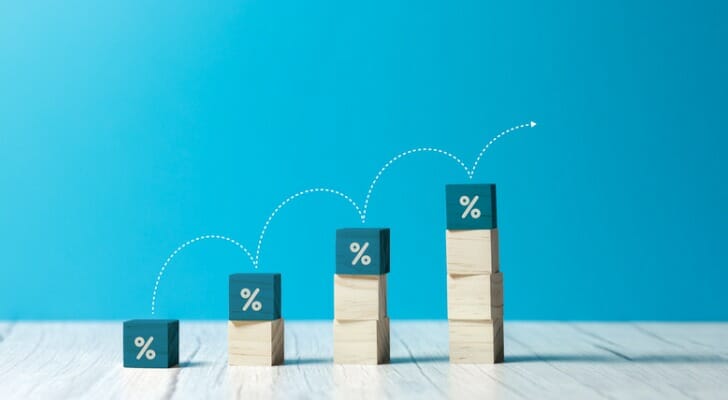A recession is defined as two consecutive months when the GDP is negative. During a recessionary economy, policymakers are striving to keep inflation and interest rates low and unemployment stable. Inflation is simply a decrease in the value of a currency, the main symptoms of which are higher prices. Both inflation and recession impact the financial markets and can be difficult for investors to navigate. We survey these two phenomena and look at ways to respond. A financial advisor can guide you in navigating uncertain financial markets to maximize your return and hedge against risk.
What Is a Recession?
A recession is usually defined as two back-to-back quarters of negative growth in the country’s economy. Growth is measured by the gross domestic product (GDP). A country’s GDP is the value of all goods and services produced in the economy in a specified time period, general quarters. GDP measures a country’s economic growth and should help guide your investment decisions.
Among factors causing inflation are shocks, such as a pandemic, asset bubbles bursting and an unusually fast-growing economy.
The National Bureau of Economic Research (NBER) makes the call about whether the U.S. is in a recession. Even though we’ve had two consecutive quarters in 2022 of a negative GDP, the usual definition of a recession, the NBER has not yet declared that the U.S. is in a recession. That may be, in part, because of the unusual nature of the economy. Unemployment rate is down and not up. The unemployment rate in the U.S., in late 2022, is 3.6%. It is among the lowest unemployment rates in modern times – and most uncharacteristic of a recession.
This recession is also unusual because the stock market is down and is trading in bear market territory. Usually, when the stock market is down, the bond market is up, but not this time. The returns on the stock and bond markets tend to be moving together, which makes investment choices even more difficult.
Inflation and the Economic Effects

A recession occurs when the economic output of an economy declines down or stops altogether. Inflation occurs when the overall price of goods and services in the economy increases. Between 1914 and 2022, the average annual inflation rate in the U.S. was 3.27%. In 2022, it jumped to a 40-year high of over 8%. Inflation is measured by the consumer price index (CPI) which is a market basket of goods and services that most people require.
There are many things that are responsible for inflation. Increased demand for goods and services can cause inflationary pressure on prices. A lack of supply can drive up the prices of goods and services for which there is demand. Shocks to the economy can inflate prices. Events like war or a pandemic are examples of economic shocks. Even normal business operations in an expansionary economy can lead to a level of inflation.
During the expansion phase of the business cycle, inflation may erupt. If the economy is expanding, consumers and businesses are buying more goods and services which would usually drive-up prices and cause inflationary pressures. In a recession, prices usually go down. However, business activity is also down. Fewer people are buying goods and services due to job losses or lower wages.
Recession, Inflation and Your Investment Portfolio
How do you insulate your investment portfolio from a falling stock market and a falling bond market and consider inflation and a possible recession? Here are some strategies you can use:
- Limit your downside risk: You need to incorporate a downside risk management element in your investment portfolio. A downside risk management program will help mitigate the risk to your investments when recession or inflation arises. It measures volatility but only negative volatility. During a turbulent period in the financial markets, it is important to limit your downside risk, but you must plan ahead.
- Tax-loss harvesting: You can use tax-loss harvesting to avoid paying taxes on some of your capital gains income. If you have investments that have been underperforming for an extended time period, now may be the time to get rid of them. Sell some of your underperforming investments. These losses will offset at least some of your capital gains.
- Beware of the bond market: Investors traditionally flee to the bond market during a downturn in the U.S. economy. However, the bond market is behaving differently than usual in 2022. When the stock market is losing value, the bond market is often up. That is not true in this economic downturn. The bond market is also suffering. Limit your bond investments to short- and medium-term high-grade bonds to lessen your interest rate risk.
- You can still own equity securities: You need to invest in equity securities in sectors of the economy that are necessary for consumers during the economic downturn such as utilities, consumer staples and healthcare. Before you invest, analyze the fundamentals of the company you want to invest in. These sectors are even better if the stocks you choose pay high dividends.
- Invest in natural resources, particularly rare minerals: Businesses that deal in natural resources and commodities often are a hedge against inflation. Rare minerals are now used in the automobile industry and the battery industry. Precious metals, crude oil and timber are all commodities that may perform well in a recession.
- Consider buying real estate: In a recession, real estate values usually drop. Consider lower real estate values as a buying opportunity.
The Bottom Line

Even though inflation is painful due to price increases across the board, a recession may be even more painful. You may lose purchasing power when there is inflation, but if there is a recession you may lose your job and your wages or your hours may be cut back. To stop your losses, controlling downside risk is particularly important and should be addressed in advance of any economic problem. It is possible to have a well-performing investment portfolio during a recession or inflation.
Tips on Investing When There Is Inflation or Recession
- It may be advisable to use a financial advisor to achieve your best results due to the complexities of the current financial markets. If you don’t currently have a financial advisor, finding one doesn’t have to be hard. SmartAsset’s free tool matches you with up to three financial advisors who serve your area, and you can interview your advisor matches at no cost to decide which one is right for you. If you’re ready to find an advisor who can help you achieve your financial goals, get started now.
- Check out SmartAsset’s inflation calculator. It will help you determine the value of your money over time as you factor inflation into the picture.
Photo credit: ©iStock.com/Nirunya Juntoomma, ©iStock.com/shutter_m, ©iStock.com/Inside Creative House
